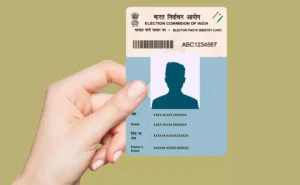GS2 – Polity

Context
The Election Commission of India (ECI) informed the Supreme Court that Aadhaar and ration cards cannot be considered valid proof of voter eligibility.
Key Highlights
- Constitutional Position
- Article 326 of the Constitution: Grants voting rights only to Indian citizens aged 18 or above.
- The ECI, in its affidavit, emphasized that Aadhaar and ration cards do not meet the citizenship requirement under Article 326.
- In support, it referred to cases like Rani Mistri v. State of West Bengal, reaffirming that Aadhaar does not establish citizenship or domicile status.
- Distinction between Identity and Citizenship
- Aadhaar is a proof of identity, not of citizenship.
- From January 2024 onwards, Aadhaar cards carry a disclaimer: “Aadhaar is not proof of citizenship”.
- Ration cards, issued under the National Food Security Act, are also unreliable due to the prevalence of fake and temporary cards.
- Why Aadhaar Is Still Collected
- Despite Aadhaar not being proof of citizenship, it is collected during exercises like Bihar’s Special Intensive Revision of Electoral Rolls.
- Legal Basis: Section 23(4) of the Representation of the People Act, 1950, introduced via the Election Laws (Amendment) Act, 2021, permits the linking of Aadhaar to voter ID for identity verification and to eliminate duplicate entries.
- Voluntary Submission: Voters are not legally mandated to provide Aadhaar for registration.
- Significance for Electoral Governance
- Preservation of Universal Adult Suffrage: Reinforces that voting rights are exclusively for Indian citizens.
- Prevention of Electoral Misuse: Exclusion of welfare-based documents like ration cards prevents misuse due to their inadequate citizenship verification.
- Balance of Inclusion and Integrity: While Aadhaar improves identification, its limited role preserves electoral integrity.
Way Forward
| Measure | Description |
| Core Document Awareness | Publicise the list of 11 valid documents accepted as voter ID proof to reduce confusion. |
| Public Awareness Campaigns | Conduct targeted outreach in vulnerable and remote areas. |
| Field-Level Training | Train Booth Level Officers (BLOs) to assist voters lacking proper documentation. |
| Offline Support | Offer non-digital alternatives to avoid exclusion due to digital illiteracy. |
| Grievance Redressal | Set up clear, time-bound mechanisms to resolve exclusion or documentation issues. |




